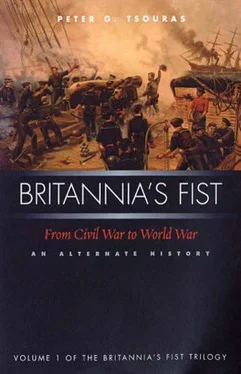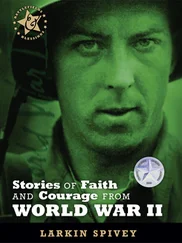Peter Tsouras - Britannia's Fist - From Civil War to World War
Здесь есть возможность читать онлайн «Peter Tsouras - Britannia's Fist - From Civil War to World War» весь текст электронной книги совершенно бесплатно (целиком полную версию без сокращений). В некоторых случаях можно слушать аудио, скачать через торрент в формате fb2 и присутствует краткое содержание. Год выпуска: 2008, ISBN: 2008, Издательство: Potomac Books Inc., Жанр: Альтернативная история, на английском языке. Описание произведения, (предисловие) а так же отзывы посетителей доступны на портале библиотеки ЛибКат.
- Название:Britannia's Fist: From Civil War to World War
- Автор:
- Издательство:Potomac Books Inc.
- Жанр:
- Год:2008
- ISBN:9781574888232
- Рейтинг книги:3 / 5. Голосов: 1
-
Избранное:Добавить в избранное
- Отзывы:
-
Ваша оценка:
- 60
- 1
- 2
- 3
- 4
- 5
Britannia's Fist: From Civil War to World War: краткое содержание, описание и аннотация
Предлагаем к чтению аннотацию, описание, краткое содержание или предисловие (зависит от того, что написал сам автор книги «Britannia's Fist: From Civil War to World War»). Если вы не нашли необходимую информацию о книге — напишите в комментариях, мы постараемся отыскать её.
Britannia's Fist: From Civil War to World War — читать онлайн бесплатно полную книгу (весь текст) целиком
Ниже представлен текст книги, разбитый по страницам. Система сохранения места последней прочитанной страницы, позволяет с удобством читать онлайн бесплатно книгу «Britannia's Fist: From Civil War to World War», без необходимости каждый раз заново искать на чём Вы остановились. Поставьте закладку, и сможете в любой момент перейти на страницу, на которой закончили чтение.
Интервал:
Закладка:
But Lincoln was on a roll and went on. “It makes me think of an Indian chief that we had out West. He was visited by an Englishman once who tried to impress him with the greatness of England. ‘Why,’ said he to the chief, ‘the sun never sets on England.’ ‘Humph!’ said the Indian. ‘I suppose it’s because God wouldn’t trust them in the dark.’” 11
They were still laughing when Fox entered the room to lay out the facts in stark detail. The two rams were iron hulled, 230 feet in length by 45 feet in the beam. They carried 4.5 inches of armor on the hull, which was designed to be only 6 feet above the waterline. They carried four heavy 9-inch British rifled guns, two each in twin turrets in 10 inches of armor. They had a speed of 10.5 knots and a cruising range of 3,000 miles. Most ominously, though, were the 7-foot steel rams jutting from the prows, an innovation reintroduced from ancient times.
“Those are facts, gentlemen, of the ships themselves. The ships are Numbers 294 and 295, and are being built in the same slip as the Alabama . Mr. Dudley’s quick fingers have acquired for us the intent of the rebels. Their chief agent in Britain, James Bulloch, has written, ‘I designed these ships for something more than harbour or even coast defence, and I confidently believe, if ready for sea now, they could sweep away the entire blockading fleet of the enemy.’”
Lincoln calmly broke the silence that followed that announcement. “Gus, when do we expect the first ship to be finished?”
“Our best estimate is late September, sir.”
Lincoln turned to Seward. “Mr. Secretary, have we exhausted every means to persuade the British government to intervene and block the delivery of these ships?”
“Mr. President, we face the subtle but no less malevolent hostility of Palmerston. The Prime Minister works his hostility out like a puppeteer. Russell can do nothing to block him. His Chancellor of the Exchequer, Mr. Gladstone, is his ally. Is there anyone in this room that forgets his open endorsement of British recognition of the Confederacy last October?” Seward snorted in disgust. “He openly stated that the rebels had made a government and an army, and infamously ‘what is more than either, they have made a nation.’ 12He publicly announced that the Confederacy would win its independence. The announcement caused a sensation in Europe and a case of delirium in the South.”
Lincoln seemed lost in thought once Seward finished speaking, and no one else wanted to break into it. The clicking of the clock filled the room. The President leaned back in his chair, crossed his gangly legs, and put his long hands on the armrests. “Since the early days of this administration, I have done everything in my power to avoid being dragged into a second war, firm in the belief that the Union can bear only one war at a time. That is why during the Trent Affair I chose to suffer the public outrage and return the Confederate commissioners. The British were serious about war, and we were not.”
Turning to look at John Bright’s picture on the wall, he said, “There are times when a policy simply can no longer be sustained. Our foreign trade is in a shambles, our merchant fleet in ruins or fled to foreign flags, economic ruin spreads along the East Coast. There may come a time when I can no longer ignore these injuries.” Looking at Seward, he said, “Mr. Secretary, we must prepare a message for Mr. Adams to present to Lord Russell, a message that his government cannot ignore, that there is a line that cannot be crossed.”
Fox saw his opening. “Mr. President,” then remembering Welles, he added, “Mr. Secretary,” and nodded. Navy Secretary Welles was a man who could be ruffled, if the proprieties were ignored. “May I suggest another measure that could prevent a war even if the British look the other way while the ships escape into international waters?”
Lincoln was intrigued, “Go on, Gus.”
“As you know, the Foreign Enlistment Act was passed some years ago ostensibly to prevent British subjects from violating British neutrality by providing overt military assistance to a belligerent. Unfortunately, for us, the law was written so loosely that the Confederates have been able to sail the equivalent of a commerce-raiding fleet through it.
“The law forbids British subjects and firms from supplying ships of war to a belligerent, that is, ships outfitted with guns, ammunition, and military fittings in general. It also forbids the recruitment of British subjects as crews for belligerent warships. Our rebel friends get around this by building what are obviously commerce raiders but without the guns, ammunition, and fittings. Then as with the Alabama , they sneaked it out of Liverpool Harbor and sailed it off to the Azores, where it married up with another ship carrying guns, ammunition, fittings, and military stores, as well as a mostly British, former Royal Navy crew. The military cargo was transferred and fitted to the commerce raider in short order.”
Seward added, “We have evidence that British officials from the harbor master in Liverpool to the Foreign Ministry itself connived to alert the Confederate agents in the port to take the ship out when our diplomatic pressure became too great.” He nodded to Fox to continue.
“Yes, that is just my point. We can expect the British to try this again. If we intercept the rams just outside of British waters in the Irish Sea, we can seize or sink them easily since they will be unarmed and with minimal crew.”
Seward thumped the table with a bang. “Excellent. Just what I have been recommending to you, Gideon!”
Welles glowered. “And I have told you, Bill, we simply do not have the warships to pull off blockade duty. Even one purpose-built warship is too much.”
Fox had an answer. “Mr. Secretary, we do not need to use such ship. The rams will be unarmed and with only a small transfer crew on its sea trials voyage. What we need is something fast with a bold captain to strike suddenly like a shark.”
Lincoln said, “I like what I’m hearing. Go on, Gus. And what will you use if not a purpose-built warship? And who will be our bold captain?”
“I have him downstairs, Mr. President. It is Lt. Roswell Lamson of the Nanesmond . I took the liberty of ordering him to the Navy Yard.”
“I’ve heard of this young man. Didn’t he bring in quite prize just a few days ago?”
“Yes, sir, the fastest ship on record, the British mail packet the Margaret and Jesse . And here is my second point. Such a stroke requires the greatest speed and agility, and that is just what the Margaret and Jesse has-sixteen knots to the ten and a half knots for the rams.”
“But this ship isn’t armed, is it?”
“No, sir, but that can be remedied in ten days at the Navy Yard if I have priority. The guns, fittings, and skilled workmen are there. They’ve worked wonders before.”
“Well, Gus, you’ve brightened my day considerable. Let’s meet this young man.”
All this time Sharpe and Lamson had been in the middle of an animated conversation. Lamson found himself pouring out everything he knew about blockade-running prompted by one deft question after another from Sharpe. Lamson was in the middle of his account of running down the Margaret and Jesse when a secretary announced that the President would see him. He straightened his uniform; slicked back his straight, dark hair; and followed the secretary as Sharpe sent after him an encouraging, “Good luck, Lieutenant.”
When they were alone, Dana leaned over to speak in confidence. “Colonel, your report of the contraband, George, caused quite a stir here coming on the heels of Morgan’s raid.”
Sharpe had hoped that it would. He asked, “How so?”
Читать дальшеИнтервал:
Закладка:
Похожие книги на «Britannia's Fist: From Civil War to World War»
Представляем Вашему вниманию похожие книги на «Britannia's Fist: From Civil War to World War» списком для выбора. Мы отобрали схожую по названию и смыслу литературу в надежде предоставить читателям больше вариантов отыскать новые, интересные, ещё непрочитанные произведения.
Обсуждение, отзывы о книге «Britannia's Fist: From Civil War to World War» и просто собственные мнения читателей. Оставьте ваши комментарии, напишите, что Вы думаете о произведении, его смысле или главных героях. Укажите что конкретно понравилось, а что нет, и почему Вы так считаете.












